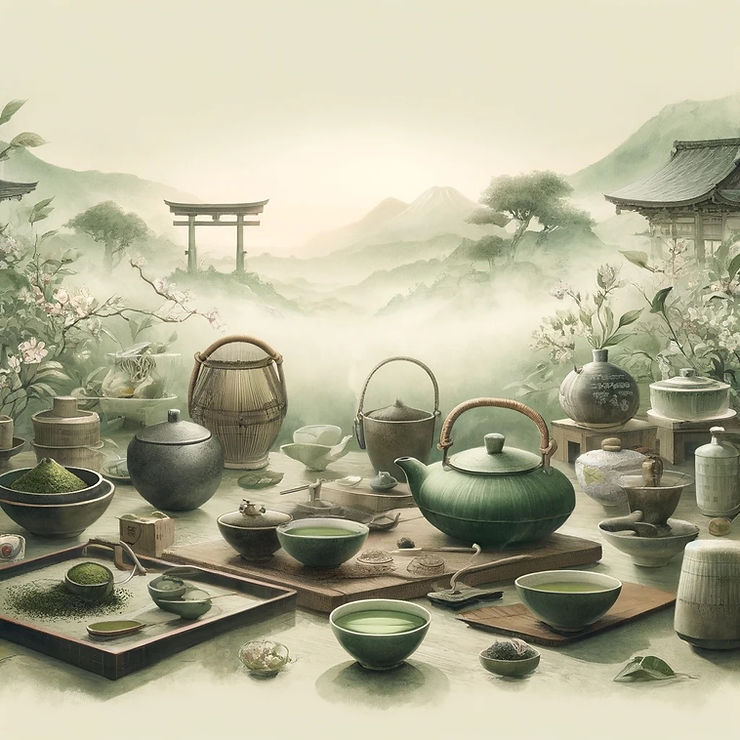Guide to Japanese tea drinks: from Matcha to Genmaicha
- Eli z Takara

- Apr 17, 2024
- 4 min read
Introduction Japan is known for its rich heritage and cultural traditions, and tea in this culture plays a key role. Tea in Japan is not just an ordinary beverage, but an important part of the culture, symbolizing hospitality and tranquility. In this guide, we will explore five popular types of Japanese teas that every tea lover should try.

Main Types of Japanese Teas
Matcha: This finely ground green tea is the cornerstone of the Japanese tea ceremony. Matcha is made from shade-grown tea leaves, which are protected from direct sunlight for several weeks before harvest. This process intensifies the green color of the leaves and increases their chlorophyll content. Matcha is prized for its full flavor and energizing effects.
Sencha: The most widespread and popular green tea in Japan, characterized by a fresh herbal aroma and subtle bitterness. Sencha is full of antioxidants that support heart health and overall well-being.
Gyokuro: Known as "precious dew," Gyokuro is a premium green tea cultivated under shade similar to Matcha. It offers a deep, rich flavor and is highly prized among tea connoisseurs.
Hojicha: This tea differs from other green teas in that the tea leaves are roasted, giving it its characteristic smoky flavor. Hojicha contains less caffeine and is ideal for evening drinking.
Genmaicha: Genmaicha combines green tea with roasted rice grains, giving it a unique nutty flavor. It is a popular choice for those seeking a comforting and warming beverage.
Preparation and Serving
Proper tea preparation is key to unlocking its best flavors.
We'll include tips on steeping each type of tea and introduce traditional Japanese utensils, such as the kyusu teapot and chawan bowl, which are ideal for tea preparation and serving.
Kyusu is a traditional Japanese teapot, particularly suitable for preparing green teas like sencha or gyokuro. It has a side handle that makes pouring easy and often features a built-in strainer to help capture fine tea leaves when pouring.
Chawan is a deep bowl traditionally used for preparing and serving matcha as part of the tea ceremony. Preparing matcha involves whisking powdered tea with hot water using a special bamboo whisk called a chasen until frothy.
For proper steeping of each type of tea, it's important to use the right water temperature and steeping time. For example, sencha is typically steeped at around 70-80 degrees Celsius for 1 to 2 minutes, while gyokuro is recommended to steep at a lower temperature, around 50-60 degrees Celsius, and for a longer steeping time, about 2 to 3 minutes.
Matcha requires hot but not boiling water, usually around 80 degrees Celsius, and is whisked to a froth. This approach to tea preparation allows for the full development of flavor and aroma, ensuring an authentic Japanese tea drinking experience.
The health benefits of Japanese tea are well documented in scientific studies, highlighting its multifaceted health benefits. Regular consumption of Japanese tea, especially green tea, can contribute to better overall health and reduce the risk of certain chronic diseases.
Antioxidants and Green Tea
Japanese green teas like sencha, gyokuro, and matcha are rich in catechins, particularly epigallocatechin gallate (EGCG), which is one of the most powerful known antioxidants. These antioxidants play a key role in protecting body cells from damage caused by free radicals. Free radicals are unstable molecules that can contribute to the development of chronic diseases, including heart disease and cancer.
Heart Health
Studies suggest that regular consumption of green tea may help reduce the risk of heart disease. Antioxidants in green tea can improve heart health by lowering LDL cholesterol levels (bad cholesterol) and increasing HDL cholesterol levels (good cholesterol). Additionally, they may also help lower blood pressure.
Weight Management
Green tea, especially matcha, is known for its potential to contribute to weight management. Caffeine and catechins in green tea can increase metabolic expenditure and improve the efficiency of fat burning.
Cancer Prevention Research suggests that polyphenols found in green tea may help prevent several types of cancer, including breast, prostate, and colon cancer. Antioxidants in tea may inhibit the growth of cancer cells and promote their destruction.
Improved Mental Functions
Regular consumption of green tea can also improve cognitive function, especially in older adults, reduce the risk of Alzheimer's disease, and other forms of dementia. The combination of caffeine and L-theanine in green tea can improve various aspects of brain function, including increased alertness and improved reaction time. Regular consumption of Japanese tea offers a wide range of health benefits, ranging from improved heart health to potential protection against chronic diseases. Japanese tea is not only delicious but can also be a strong ally in supporting long-term health.
Conclusion
The diversity of Japanese teas offers not only a wide range of flavors and aromas but also brings a variety of health benefits that can enrich everyday life. From the relaxing ritual of tea preparation and drinking, to its ability to improve mental functions, and potential protection against chronic diseases - Japanese tea is more than just a beverage. It is an experience that enhances quality of life and brings moments of tranquility in our often hectic world. Incorporating Japanese teas into your daily routine can be a great way to remind yourself of the importance of caring for both body and mind.








Comments